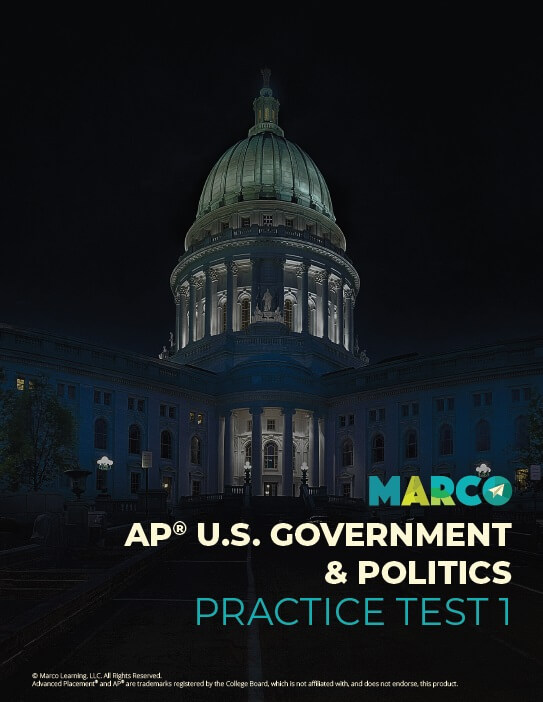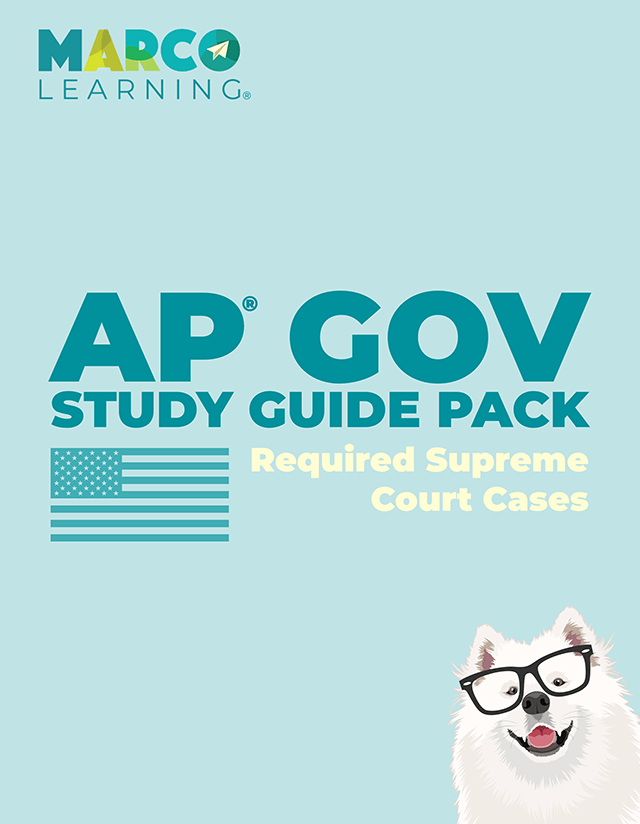


To score well on your AP® U.S. Government and Politics Exam, it is important to become familiar with all of the required Supreme Court cases. In the free-response section of your AP U.S. Government Exam, you will have to answer four essay questions. The third of these questions is a SCOTUS comparison essay, in which you will be required to compare a non-required Supreme Court case with a required Supreme Court case, so get to know each required Supreme Court case as well as possible!
The required Supreme Court cases for the AP U.S. Government and Politics Exam in 2021 are:
Marbury v. Madison (1803)
McCulloch v. Maryland (1819)
Schenck v. the United States (1919)
Brown v. Board of Education (1954)
Engel v. Vitale (1962)
Baker v. Carr (1962)
Gideon v. Wainwright (1963)
Tinker v. Des Moines Independent Community School District (1969)
New York Times Co. v. United States (1971)
Wisconsin v. Yoder (1972)
Roe v. Wade (1973)
Shaw v. Reno (1993)
United States v. Lopez (1995)
McDonald v. Chicago (2010)
Citizens United v. Federal Election Commission (2010)
FACTS OF THE CASE
In 2008, a conservative non-profit organization called Citizens United made a film entitled Hillary: The Movie. The film was very negative in its portrayal of then-presidential candidate Hillary Clinton and was clearly intended to influence voters. A lower court ruled that Citizens United’s film violated the 2002 Bipartisan Campaign Reform Act’s prohibition on “electioneering communication” by a corporation or labor union immediately before an election.
When Citizens United appealed the lower court ruling before the Supreme Court, the justices faced a number of questions about previous court rulings and the BCRA, commonly known as McCain-Feingold. Ultimately, the case was broader in scope than the Citizens United’s film; the question before the Court was whether restrictions on political spending violated the First Amendment right to free speech.
THE DECISION
In a 5-4 opinion, the Court ruled that the First Amendment protects political spending by advocacy groups and political action committees and that the BCRA’s restrictions on such spending were unconstitutional. In a separate 8-1 vote, the Court upheld the BCRA’s disclosure requirements for political spending as well as the prohibition on corporations and unions contributing money directly to political candidates.
Overturned: Austin v. Michigan Chamber of Commerce (1990) McConnell v. FEC (2003) (in part).
IMPACT
The decision in Citizens United v. FED (2010), made along ideological lines in what many Americans view as an increasingly ideological Supreme Court, remains extremely controversial. The case illuminated a central tension in American politics: people are generally uncomfortable with the idea of elections being controlled by the wealthy, but are simultaneously hesitant to restrict individual liberties, especially freedom of speech. Opponents of the ruling have developed mantras such as “Corporations aren’t people” and “Money isn’t speech,” while defenders of the ruling view it as a crucial protection for their political advertising strategies. Numerous states had to change their campaign finance laws as a result of the ruling, and there has been a rise in the power of so-called “super-PACS,” political action committees that are permitted to engage in unlimited political spending on behalf of candidates (but not to contribute directly to their campaigns.)
KEY TERMS
Soft Money Political donations that are given to a particular political party, but not a specific candidate – not heavily regulated.
Hard Money Political donations that are given to a particular candidate or political action committee (PAC)-some regulations.
Disclosure Informing the public who is behind political advertisements or spending.
The best way to get better at something is by practicing.
That’s why it’s so important that you take practice tests to help you get better at the AP U.S. Government and Politics Exam. Only then can you expect to get a good score—and even improve your score.
 Help
Help